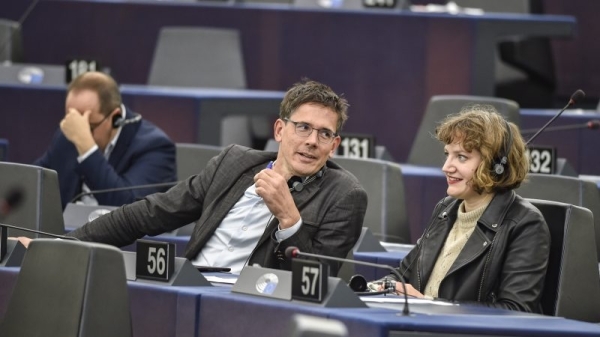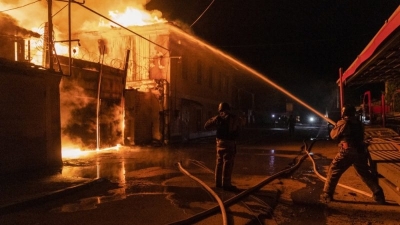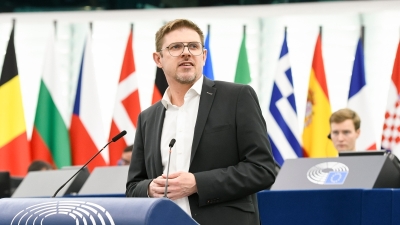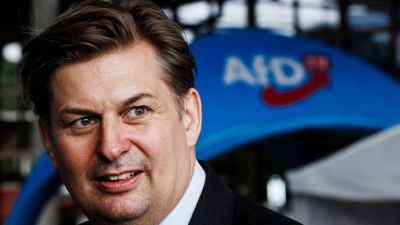French Greens play spoilsport as EU Parliament votes on carbon market reform

The French Greens in the European Parliament are expected to reject the proposed extension of the EU’s carbon market rules to transport and heating fuels in a vote in Strasbourg on Tuesday (18 April).
In December, negotiators from the European Parliament, the Commission and EU member states reached agreement on the reformed Emissions Trading Scheme (ETS), the EU’s carbon market and flagship climate policy tool.
A key sticking point in the reformed ETS was a proposal to extend carbon pricing to heating and transport fuels, such as petrol, diesel, heating oil and gas, which will start applying as of 2027.
The new carbon tax is expected to add 10 eurocents to the price of petrol, but its impact will be softened by the introduction of a new social climate fund worth €87 billion.
The agreement is now coming to the European Parliament for a final vote on Tuesday, where it is expected to win backing from the main political groups, including the Greens.
Ahead of the vote, MEPs expressed confidence that the package, including a Carbon Border Adjustment Mechanism (CBAM), will be approved.
“I expect a solid majority,” the French MEP Pascal Canfin, who represented the centrist Renew group during the negotiations, told EURACTIV.
However, while the centre-right European People’s Party (EPP), the Socialists and Democrats (S&D), and the centrist Renew group will vote in favour of the reformed ETS, the Greens, while supporting the reform, are divided.
The French Greens, in particular, are expected to oppose the reformed ETS, and it is unclear whether their socialist counterparts in S&D, who in France are part of the left-wing alliance NUPES, will follow them or not.

EU approves CO2 tax on heating and transport, softened by new social climate fund
EU legislators agreed early on Sunday (18 December) to introduce a carbon price on buildings and road transport fuels, with a new €87-billion social climate fund established in parallel to cushion the impact on households and help them invest in green solutions.
French opposition
Peter Liese, a German conservative MEP and the European Parliament’s lead negotiator on the reformed ETS, told EURACTIV that he “heard that the French Greens would vote against”.
Marie Toussaint, a French MEP from the Greens/EFA group, confirmed to EURACTIV her delegation’s dissenting position.
“We all believe that carbon should have a price, but we oppose the approach of making citizens pay for inaction for which they are not responsible,” she said.
By applying carbon pricing to heating and road transport, the carbon market will indeed represent an additional cost for households from 2027. However, according to German MEP and negotiator for the Greens, Michael Bloss, this cost will be minimal.
From 2027 to at least 2030, the extra tax will be capped at €45″, he said. This represents more or less the current price of a tonne of carbon in France (€44.60), which was frozen following the Yellow Vests’ movement.
It is “largely the French experience of the Yellow Vests’ movement” that motivates the French delegation’s opposition to the reform, Toussaint explained.
Indeed, some experts doubt that the €45 per tonne carbon cap can be kept at that level over time, as they believe this will depend on the demand for heating and fuel over the expected freeze period.

French opposition warns against social unrest after EU carbon market reform deal
The decision to include households in the EU carbon market is causing a stir among French lawmakers on the far-right and far-left of the European Parliament who are united in their opposition to the proposal.
Safeguards
The negotiators introduced other safeguards before the new carbon tax becomes effective. For instance, the new scheme could be delayed by a year, until 2028, if energy prices remain “exceptionally high”, the Parliament said in a statement.
But this is insufficient for the French Greens, who suggested other leftwing MEPs in the Socialists and Democrats (S&D) group were undecided.
“The Socialists are still discussing their position,” Toussaint said.
When he debriefed journalists on the deal in December, Canfin said the price increase will not be felt in France, which already has a carbon price on transport fuels.
“We put strong safeguards in place to make sure it’s socially just and sell it politically,” Canfin said, pointing to a price cap of €45 per tonne of CO2 ensuring that the increase in fuel price doesn’t exceed 10 eurocents at the pump.
“In France it’s €44, so when the cap enters into force, the social consequence for households will be close to zero,” Canfin assured, adding that the 10 eurocent price increase is a theoretical maximum. “In many cases it will be much less and in the French case, nothing.”
Mohammed Chahim, a Dutch MEP and rapporteur for the S&D group for the EU’s carbon border adjustment mechanism, said he is “convinced” of his group’s support for the revised ETS.
“It’s not only the S&D that’s supporting the deal – it’s also the Greens, the Left, EPP and Renew,” he told journalists on Friday, even though he conceded that some MEPs in the EPP and Renew were not fully happy with the deal.
“But we have a strong majority,” he said, pointing to the “big support” for the ETS reform in the Parliament’s environment committee.
Alongside the extension of the carbon market, the package also includes a social climate fund to partially offset the cost of the carbon tax for road transport and heating fuels.
Left-wing MEPs, like the Greens, welcome the move and will vote for its introduction, even if they regret the lack of budgetary ambition.
“We could have hoped for a higher amount,” Manon Aubry, French MEP and co-president of the United Left group, told a press conference on Friday.
The social climate fund will have €87 billion that will be available as of 2026.
Far-right and conservatives will abstain or vote against
The far-right Identity and Democracy (ID) group, for their part, said they would reject both the reformed ETS and the social climate fund.
“It’s pure punitive ecology, very vague in its means and very questionable in its end,” a source close to Catherine Griset MEP, the French delegation’s referent to the ID group on these issues, told EURACTIV.
And the nationalist European Conservatives and Reformists (ECR) group, while initially supportive of the reformed ETS, said on Monday that they had changed their voting indication to abstention.
“Our Polish delegation will even vote against,” an ECR spokesperson told EURACTIV in emailed comments.
Despite opposition from the leftists and far-right, the package of carbon market reform texts are still expected to be adopted.
“Let’s hope the council will do the same the week after that, and that there will ne no surprise like we had with e-fuels,” Chahim said, referring to Germany’s last-minute objection to the EU’s CO2 regulation for new cars.

EU lawmaker bets on Macron to limit fuel price increase
Ahead of a vote on the EU’s carbon market reform, Green lawmaker Michael Bloss reassured consumers that carbon prices will not go above the €45 limit, citing a political commitment by French president Emmanuel Macron.



